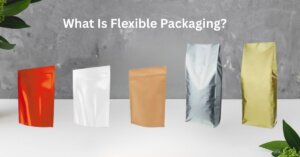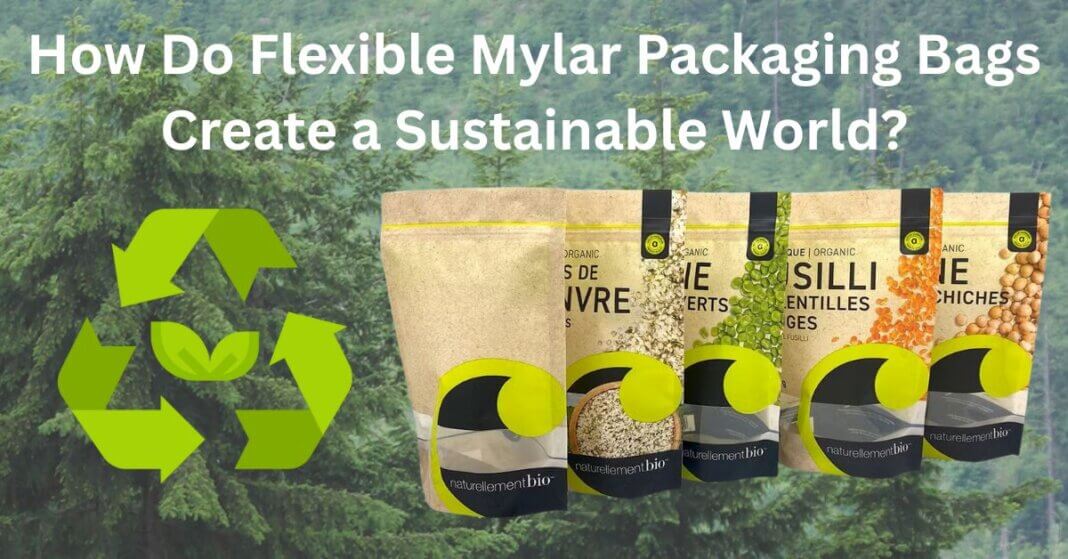Do Flexible Mylar Packaging Bags Create a Sustainable World?
By Jack Ross
The simple meaning of sustainability is growth and continuation without interruption. But Merriam Webster goes one step further, it says, ‘relating to a lifestyle involving the use of sustainable methods. When we discuss the environment and living, it is all about the overall lifestyle.
For instance, sustainability will prompt us towards natural energy sources, clean water, and electric vehicles, too. In the suburbs, there is less car use and less waste. In rural areas, it’s protecting land and water. When everyone joins, the Earth becomes stronger and healthier for all.
Towns, cities, and countries must act now. Cities need clean energy and better waste plans. Small towns must recycle more and protect nature. Countries should pass strong green laws. Our world feels the strain.
Trash is piling up in landfills. CO₂ from cars and factories is filling the air. Landfills leak damage water and soil. These problems harm people’s health. They also make daily life harder. Waiting longer will only make fixes more difficult.
Our casual habits also make things worse. Those are the people who use plastic and non-recyclable products, then throw them around. Each habit increases pollution and heat. When towns set green goals, they protect health and safety.
Cleaner power and better design create brighter, greener futures for everyone. However, at the same time, product packaging is also crucial for a green environment. Because whatever people buy, eventually they buy in some packaging products.
Today’s blog will highlight the importance of recyclable packaging in a net-zero future.
How Packaging Shapes Up A Greener Environment?
Our lives are filled with packaged products. However, many types of packaging end up in landfills or are lost in the ocean. This trash does not go away quickly. It stays for years. That is why packaging plays such a significant role in our environmental problems today.
Traditional plastics cause the most harm. Many cannot be recycled. Plastic packaging is harmful to rivers, sea life, and pollutes the soil. Animals often eat plastic and suffer. And it is not only about animals; humans also suffer from disposable products.
The world is now looking for better answers. Businesses are turning to greener packaging. Some use recycled paper. Others test compostable or plant-based films. Countries are also passing laws to cut plastic use. The shift is global. It shows that people are ready to change for the sake of sustainability.
Consumers today notice packaging choices, too. Many prefer eco-friendly brands. They want companies that protect the Earth. This demand pushes industries to adopt recyclable flexible packaging. It is lighter, uses less material, and reduces waste. For these reasons, it is becoming one of the best packaging solutions.
What Is Flexible Packaging?
 Flexible packaging is a soft packaging product that you can bend or fold. Chip bags, snack pouches, and coffee packs are good examples of it. It is not heavy like jars or boxes. Retailers prefer it because they can produce it in less time. And it also cuts shipping costs.
Flexible packaging is a soft packaging product that you can bend or fold. Chip bags, snack pouches, and coffee packs are good examples of it. It is not heavy like jars or boxes. Retailers prefer it because they can produce it in less time. And it also cuts shipping costs.
Many consumers like it because it is easy to carry. Eco-conscious packaging companies make these bags with polyethylene films, paper, or foil materials. These materials are safe for food, and they protect products from oxygen and contamination.
Flexible packaging also uses less material than bottles or cans. When designed with recyclable films, it becomes more environmentally sustainable. With each passing day, businesses are shifting towards lightweight, bendable packaging. Mylar bags are one of the most well-known flexible packaging products.
How Mylar Bags Have Become A Sustainable Packaging Solution?
Packaging companies make Mylar bags from a strong Biaxially Oriented Polyethylene Terephthalate (BOPET) Material. It is a flexible, shining, and light packaging material. Retailers use it to keep products safe from air, contamination, and moisture.
Custom Mylar bags provide products with a long and optimal shelf life. They keep food and edibles fresh. Now, businesses opt for Mylar bags with a focus on the environment. Some Mylar bags are recyclable, while others are more easily integrated into recycling systems.
Many of the manufacturers use bio-based films made from plants. Innovation in Mylar packaging has reduced plastic waste. For businesses, custom pouches bring two big advantages. First, they keep products safe and fresh. Second, they are used as a branding mechanism.
Retailers and manufacturing companies can print designs, logos, or messages on them, too. At the same time, sustainable taglines let brands show their care for nature. Almost every businesses use them for their product packaging.
You can see them for snacks packaging, chips packs, coffee pouches, and many more types of commodities. Even cosmetics companies use them for their products. Beauty brands use them for face mask packaging, as lotion packs, and bath salts.
Environmental and Economic Impact of Reusable Pouch Packaging
Recyclable flexible packaging is a blessing. It protects the landfills from trash. On the other hand, if you choose plastic, then it pollutes the environment for centuries. Hence, it means the masses have access to clean water, a safer Earth, and transparent air to breathe.
These lighter packs also lower greenhouse gases. Trucks carrying them burn less fuel. Using less fuel means less smoke in the sky. It helps slow climate change. Recycling systems also work better with flexible packaging made from Mylar films.
Mylar packaging films are easier to sort, melt, and use again. Old bags can be transformed into new ones instead of being sent to landfills. This cycle conserves resources and maintains a strong and valuable packaging loop. Indeed, this concept is known as the circular economy.
Let’s explore the economic aspect more. Flexible packaging bags are inexpensive to ship. Their lightweight makes them easier to ship and deliver anywhere. So, think in this way, you can ship them anywhere, even on a motorbike. And if the store is within walking distance, then they can be delivered by hand.
Another significant advantage of pouches is that they can be stacked for a longer period. Each commodity stays fresh in them. Hence, ROI (return on investment) increases because brands do not receive returns from them.
Moreover, it is challenging to tear or puncture Mylar bags. Though their material is lightweight, no one can easily pull it away. So, packaging itself remains intact for a longer time. This is why many of the pharmaceutical companies and food brands prefer Mylar packaging.
Future Outlook: Building a Greener Tomorrow with Flexible Packaging
Cities everywhere want cleaner air and less waste—many plan to be carbon-neutral in the future. Packaging reform plays a significant role here. When we cut heavy plastics, towns save energy, reduce trash, and help people live healthier lives. Small changes make big results.
Mylar bags are a strong option in this shift. They are light, flexible, and last long. New recyclable versions reduce landfill waste. Cities that support them see faster progress. What starts in one town can spread across regions, helping more countries reach green goals.
Technology also pushes this change forward. Recycling systems get smarter. Some Mylar films use compostable layers. Furthermore, customers matter too. When they pick eco packs, companies listen. Together, brands and people push markets toward better choices and greener supply chains.
The road ahead calls for teamwork. Recyclable flexible packaging, such as Mylar bags, is one effective step currently in place. It reduces trash, saves energy, and helps reach climate goals. With smart choices from businesses, governments, and buyers, towns can grow while protecting the planet at the same time.
Key Takeaways
We need to care for land, air, and water.
> Cities and towns should move fast to cut waste.
> Plastic is piling up and harming life.
> Lighter, flexible packs make less trash.
> Mylar bags protect food and goods well.
> They cost less to move and ship.
> Old pouches can be turned into new ones.
> The cycle of Mylar bag production saves energy and resources.
> Better packaging helps us build a cleaner future.
Jack Ross
Jack is a seasoned Packaging writer based in Houston. His first passion is gardening. In his leisure time, he loves to write about Mylar packaging. Eco-friendly and green packaging are his favourite niches. For the last two years, he’s been exploring biodegradable stocks for businesses and retailers. He consistently writes about sustainable packaging practices and remains committed to doing so.
